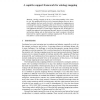Free Online Productivity Tools
i2Speak
i2Symbol
i2OCR
iTex2Img
iWeb2Print
iWeb2Shot
i2Type
iPdf2Split
iPdf2Merge
i2Bopomofo
i2Arabic
i2Style
i2Image
i2PDF
iLatex2Rtf
Sci2ools
SEMWEB
2007
Springer
2007
Springer
A Cognitive Support Framework for Ontology Mapping
Abstract. Ontology mapping is the key to data interoperability in the semantic web. This problem has received a lot of research attention, however, the research emphasis has been mostly devoted to automating the mapping process, even though the creation of mappings often involve the user. As industry interest in semantic web technologies grows and the number of widely adopted semantic web applications increases, we must begin to support the user. In this paper, we combine data gathered from background literature, theories of cognitive support and decision making, and an observational case study to propose a theoretical framework for cognitive support in ontology mapping tools. We also describe a tool called COGZ that is based on this framework.
Related Content
| Added | 09 Jun 2010 |
| Updated | 09 Jun 2010 |
| Type | Conference |
| Year | 2007 |
| Where | SEMWEB |
| Authors | Sean M. Falconer, Margaret-Anne D. Storey |
Comments (0)

